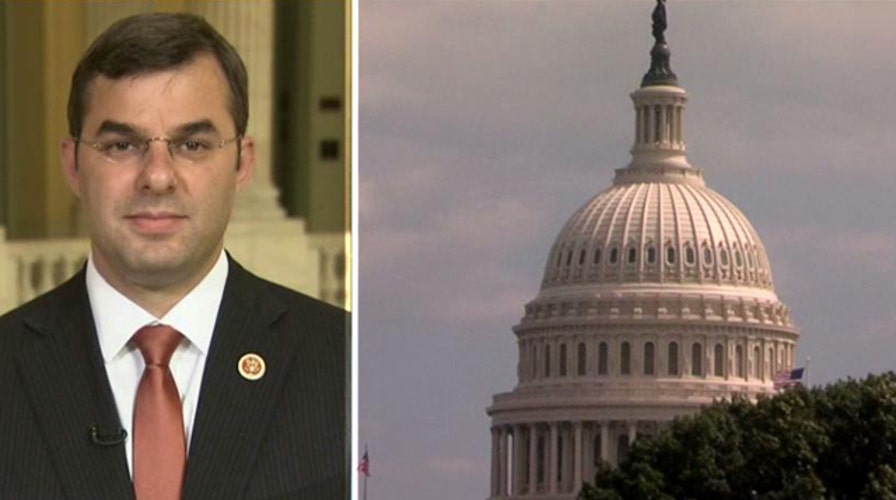This is a rush transcript from "Your World," June 11, 2013. This copy may not be in its final form and may be updated.
NEIL CAVUTO, HOST: Just to update you, that if you just tuned in, that the ACLU is the first major organization to sue the United States government, more to the point, the White House, over what it says is a freedom infringement like no other, invading people's personal privacies, their phone records and like, and a reach on the part of the NSA that goes beyond the pale.
Now, when it comes to the NSA and why it did what it did, we're about 45, 50 minutes or so from a briefing that House members, each and every one of them, are going to get on why the NSA did what it did and to whom it did.
One guy who already is threatening a brief on all of this and a lot more, Republican Congressman Justin Amash in Michigan.
Congressman, what do you make of what the ACLU has just done? Because this is the same ACLU that aggressively went after President Bush for what it deemed at the time individual liberty infringements and more. And now it is doing the same with this president.
REP. JUSTIN AMASH, R-MICH:: Thanks, Neil, for having me on.
And I applaud what the ACLU is doing. They were right to go after President Bush when he violated our civil liberties. And they're right to go after President Obama when he does the same.
And a number of members of Congress are prepared to file amicus briefs in support of their efforts.
CAVUTO: All right, now, you're going to be going into this briefing. I suppose this is going to be a top-secret type of a briefing. I don't know how you guys do this sort of thing.
But what do you want to hear out of NSA officials or whoever is ultimately going to be conducting this?
AMASH: Well, I want to hear how large the scope is of the surveillance.
I want to hear what the reasons they're going to use to justify this type of surveillance. And I want to hear about what we as a Congress can do about it to make sure that American civil liberties are protected.
CAVUTO: Now, it's very hard for 435 guys of you then to be quiet as church mice after that, right? Are you sworn to secrecy in this meeting?
AMASH: Well, it's a classified briefing. We are not going to be allowed to speak publicly about the details of the briefing.
But I hope more and more of my colleagues are waking up to the fact that a lot of what the government is doing is unconstitutional. I voted against the Patriot Act. I voted against the FISA Amendments Act. We had had a number of briefings to different degrees over the past couple of years. Not every member necessarily attended a briefing.
CAVUTO: Right.
AMASH: But I certainly knew enough to know that I should vote no on these bills, and that they were a threat to the liberties of Americans.
CAVUTO: Then, Congressman, what do you think of those who did vote for the Patriot Act and did vote for follow-up pieces of legislation that clamped down on this sort of thing in the effort of getting and keeping us safe, presumably, the shock and surprise that they didn't know that was the case?
The administration said that those who approved this sort of thing did in fact know it was the case.
AMASH: Well, I think there are several members who knew the details and understood what they were voting on and actually support the efforts of the administration.
And there are many other members, probably a larger number of members, who, even though they knew the details, maybe didn't under the scope of what was going on and feel a bit betrayed right now. I'm hopeful that they can realize the extent to which the government is violating the rights of Americans and change their minds about these votes in the future...
(CROSSTALK)
AMASH: ... and look back on these bills and find ways to repeal the language that is threatening to Americans.
CAVUTO: Right. OK. But do you find the NSA itself threatening to Americans? Are you among those who advocate that it should be abolished?
AMASH: No. There's a reason to have intelligence agencies. There's a reason to conduct secret investigations. But there's a big difference between secret investigations and the kind of secret operations that go on and secret laws. Right now, what we have are secret laws. And even members of Congress aren't getting the full facts about what is in the laws.
When FISA courts issue a ruling, I can't see the opinion. Only certain members of our Intelligence Committees can receive the opinions. So I don't even know how the law is being interpreted.
CAVUTO: All right, sir, thank you. Good luck at that meeting. We will see if your colleagues stay quiet.
Content and Programming Copyright 2013 Fox News Network, LLC. ALL RIGHTS RESERVED. Copyright 2013 CQ-Roll Call, Inc. All materials herein are protected by United States copyright law and may not be reproduced, distributed, transmitted, displayed, published or broadcast without the prior written permission of CQ-Roll Call. You may not alter or remove any trademark, copyright or other notice from copies of the content.

